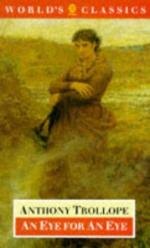As to that other matter concerning Jack and Sophie Mellerby, she could not bring herself to believe it. She had certainly seen that they were good friends,—as would have been quite fit had Fred been engaged to her; but she had not conceived the possibility of any mistake on such a subject. Surely Sophie herself knew better what she was about! How would she,—she, Lady Scroope,—answer it to Lady Sophia, if Sophie should go back to Mellerby from her house, engaged to a younger brother who had nothing but a commission in the Engineers? Sophie had been sent to Scroope on purpose to be fallen in love with by the heir; and how would it be with Lady Scroope if, in lieu of this, she should not only have been fallen in love with by the heir’s younger brother, but have responded favourably to so base an affection?
That same afternoon Fred told his uncle that he was going back to Ireland on the day but one following, thus curtailing his promised three weeks by two days. “I am sorry that you are so much hurried, Fred,” said the old man.
“So am I, my lord,—but Johnstone has to go to London on business, and I promised when I got leave that I wouldn’t throw him over. You see,—when one has a profession one must attend to it,—more or less.”
“But you hardly need the profession.”
“Thank you, uncle;—it is very kind of you to say so. And as you wish me to leave it, I will when the year is over. I have told the fellows that I shall stay till next October, and I shouldn’t like to change now.” The Earl hadn’t another word to say.
But on the day before Fred’s departure there came a short note from Lady Mary Quin which made poor Lady Scroope more unhappy than ever. Tidings had reached her in a mysterious way that the O’Haras were eagerly expecting the return of Mr. Neville. Lady Mary thought that if Mr. Neville’s quarters could be moved from Ennis, it would be very expedient for many reasons. She knew that enquiries had been made for him and that he was engaged to dine on a certain day with Father Marty the priest. Father Marty would no doubt go any lengths to serve his friends the O’Haras. Then Lady Mary was very anxious that not a word should be said to Mr. Neville which might lead him to suppose that reports respecting him were being sent from Quin Castle to Scroope.
The Countess in her agony thought it best to tell the whole story to the Earl. “But what can I do?” said the old man. “Young men will form these acquaintances.” His fears were evidently as yet less dark than those of his wife.
“It would be very bad if we were to hear that he was married to a girl of whom we only know that she is a Roman Catholic and friendless.”
The Earl’s brow became very black. “I don’t think that he would treat me in that way.”
“Not meaning it, perhaps;—but if he should become entangled and make a promise!”
Then the Earl did speak to his nephew. “Fred,” he said, “I have been thinking a great deal about you. I have little else to think of now. I should take it as a mark of affection from you if you would give up the army—at once.”




